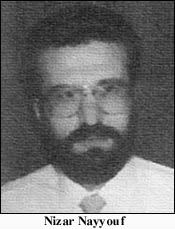 |
| Vol. 3 No. 10 | Table of Contents MEIB Main Page | October 2001 |
Turkey Blocks Chemical Shipment to Syria
On September 27, Turkish authorities stopped a truck headed for Syria at the Cilvegozu customs station and seized an estimated 1,100 lbs (500 kg) of sodium cyanide, a precursor for the manufacture of chemical weapons. The driver, Muhammed Janbia, a Syrian national, is being held for questioning to determine how he obtained the deadly chemical, which was produced and sold by a Turkish company.
Turkish State Minister Mehmet Kececiler said that border controls have been tightened to block the smuggling of biological, chemical and nuclear weapons precursors in the aftermath of the September 11 terrorist attacks in the United States.
 |
Syria to Join UN Security Council
On October 8, the United Nations General Assembly voted to approve Syria's membership on the UN Security Council for the period 2002-2003. Afterwards, State Department spokesman Richard Boucher stated that the US government expects Damascus to "meet its obligation to respect human rights and fundamental freedoms, to fulfill all Security Council resolutions and to contribute to international peace and security." Although Syria had been previously selected as the uncontested candidate of the Asia regional group for the seat apportioned to that group, US officials conspicuously declined to express any objections to this choice.
Damascus immediately hailed the vote as a refutation of long-standing allegations that it has sponsored terrorism. This "great diplomatic and political victory" underscored "the just position of Syria, which backs the fight against terrorism without confusing this phenomenon with resistance against occupation," the state-run newspaper Al-Ba'ath stated in an editorial the following day.
Syria's candidacy encountered considerable opposition among members of Congress, who insisted that Syrian membership on the Security Council would violate Article 23 of the United Nations Charter, which states that non-permanent members shall be elected by the General Assembly with "due regard being specially paid, in the first instance to the contribution of Members of the United Nations to the maintenance of international peace and security." On October 5, Rep. Eliot L. Engel (D-New York) released an open letter to President Bush, signed by 38 members of congress, stating that permitting Syria to join the security council would send "precisely the wrong signal to the international community," noting that Damascus continues to harbor several terrorist groups and therefore has not contributed to peace and security in the region.
Armitage: Syria Not Part of Coalition
On October 11, US Deputy Secretary of State Richard Armitage told reporters, "I don't consider Syria part of the coalition [against terrorism]. They've indicated from time to time they'd like to perhaps take part and then they seem to back up a little bit . . . This has been at best right now an occasion to try to open the eyes of Syria." When asked what US policy will be toward countries that do not meet Washington's expectations, Armitage replied that "the consequences might be whatever the coalition finds worthy and it runs the gamut from isolation to financial investigations, all the way up through possibly military action."